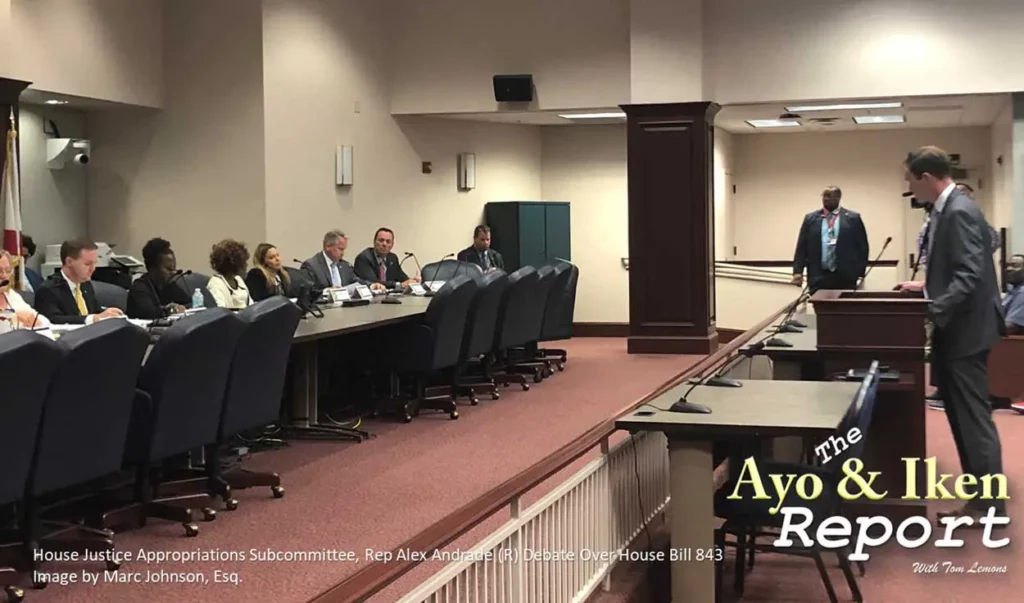Tom Lemons, Legal Correspondent
February 12, 2020
TALLAHASSEE – House Bill 843 made its way through the second phase of review Tuesday, leaving just one more committee hurdle before heading to the House floor.
Several Florida residents and expert witnesses traveled to Tallahassee to give public testimony in support and in opposition of the Bill, which would essentially do away with permanent alimony in Florida, but Bridge-the-Gap, Rehabilitative and Durational would remain in effect.

Request a Free Consultation
The other element of contention is that equal time-sharing become the presumption at the onset of child custody disputes. Bill Sponsor Alex Andrade (R) of Pensacola says it would reduce litigation time, cost to parents, court resources, and would ultimately be in the best interest of the children.
Unlike the Civil Justice Subcommittee hearing last month, which resulted favorably in a straight party line vote, the Justice Appropriations Subcommittee resulted in one Republican dissenter and a yay from one Democrat.
Rep. David Silver (D) from Palm Beach says, “I’m a child of divorce, contentious to say the least. I’m up on the bill today, but if some of the things we discussed are not there when it come up on the House floor, I can’t support it.”
Committee Chair Clay Yarborough (R) from Jacksonville voted down the bill, stating “I might determine to more greatly use equitable distribution, as a means to provide to the obligee in the absence of alimony or longer-term durational alimony, but I still have concerns about where it could leave obligees, depending on their unique situations.” Rep. Yarborough went on to voice concerns that obligees might turn to the state or taxpayer, if permanent alimony is removed.
Rep. Andrade reminded the Committee that it was a prior staff analysis that initiated concerns about an influx of state dependency and that the current staff analysis doesn’t indicate anyone would “…end up on the tax rolls.” He went on to say, “There are 44 other states that have done away with it (Permanent Alimony) in the past and you have not seen that mass movement to dependence on the state.” Rep. Andrade also remarked on the time-sharing provision, which is the concern of most Committee Democrats, stating, “… we need to de-weaponize children in this circumstance, because the most important component to a divorce that involves minor children needs to be, and continues to be the child.”
I asked Attorney Marc Johnson, one of the architects of the current bill, what he had to say about Rep. Gottlieb’s concerns that there are just too many changes in one bill. Johnsons says, “HB 843 is a significant change to existing law, and we believe it is necessary to limit judicial discretion, eliminate permanent alimony, limit durational alimony to 50% of the duration of the marriage, allow alimony payors a right to retire and create guidelines so families can more easily resolve divorce cases.” Some of the women who spoke during the hearing, voiced concerns over their disabilities and one even said she was “forced” to leave her country by a “white American,” who married her and then later divorced her. Despite some of the outlying issues, I asked Johnson if he believed equality should outweigh the minority of those who will find it difficult to transition away from permanent alimony. Johnsons said, “All of those horror stories were created under existing divorce laws, so reform should be welcomed. It is impossible to legislate the lawless behavior that many of the opponents complained about during the committee hearing. In HB 843, there will be an upcoming amendment that will provide the court discretion to extend alimony beyond retirement in extreme hardship cases.” Johnson also defended the 50/50 presumption, stating the change would be “…far better than the status quo that requires extensive posturing and litigation to fight for a greater parental timesharing ruling at the expense of the other parent.”
Once again, the Florida Bar Association openly opposed the bill during yesterday’s hearing.
HB 843 now moves on to the House Judiciary Committee for debate.

